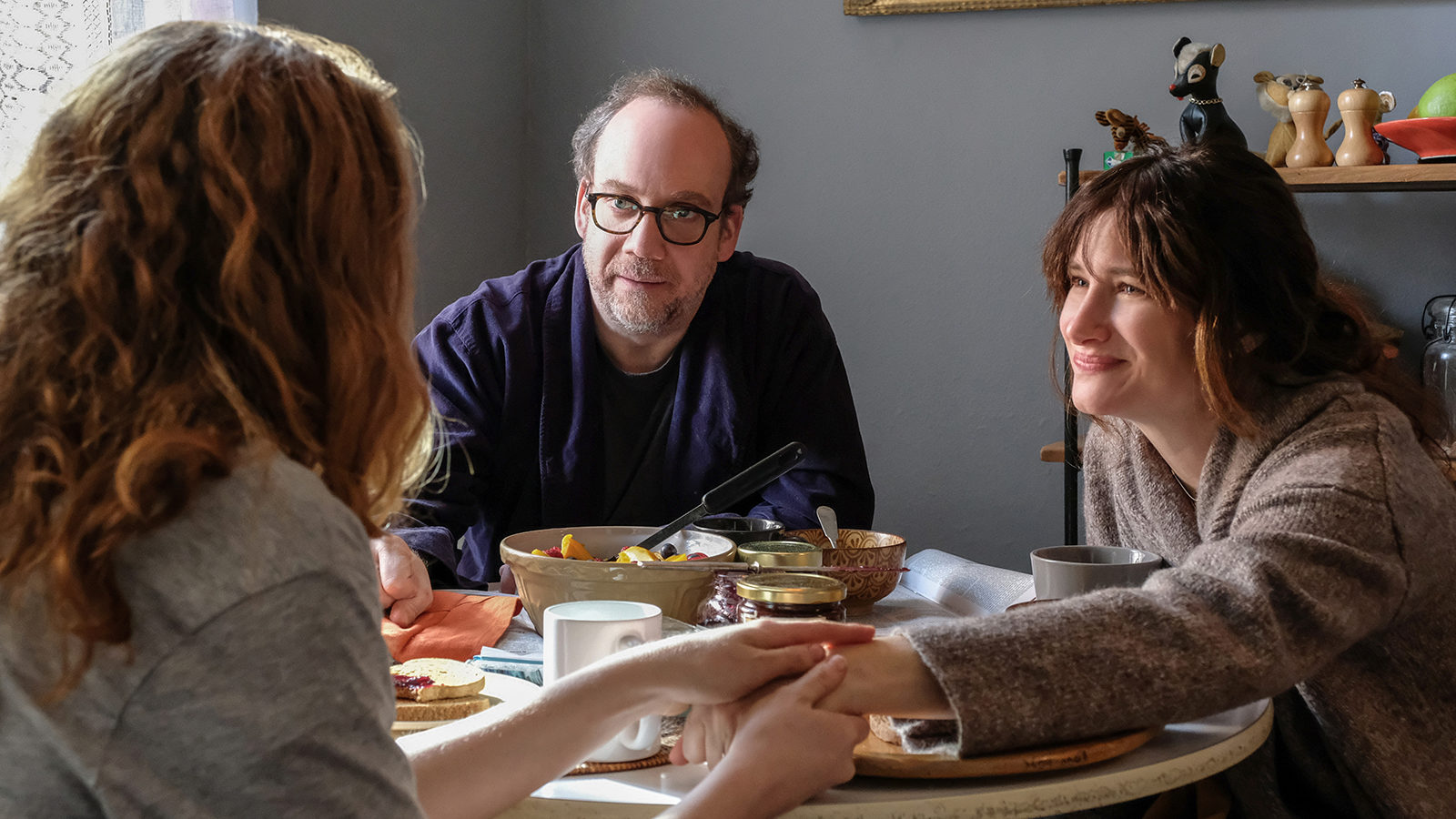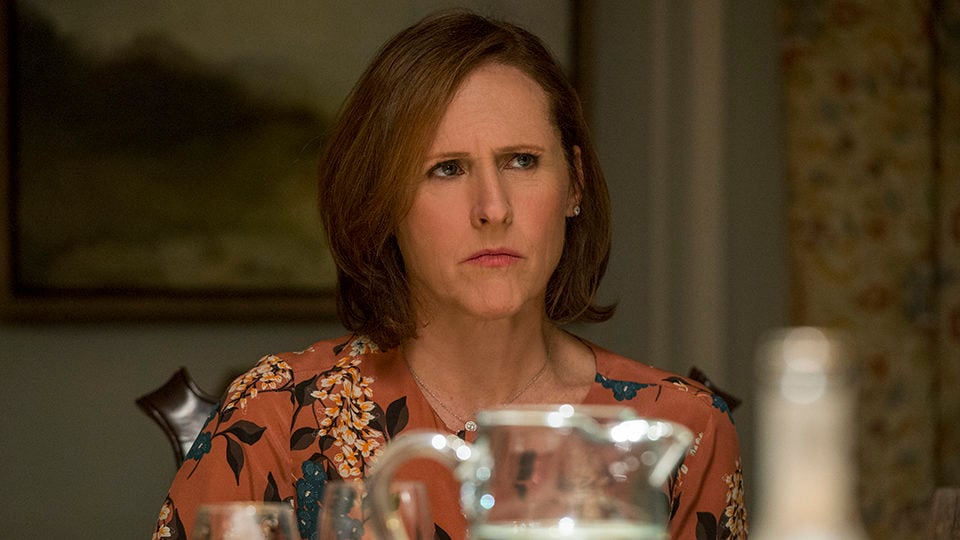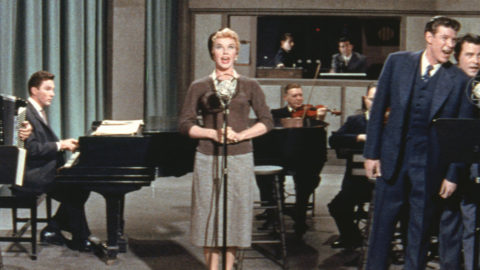
Review: Private Life
When we first meet Rachel (Kathryn Hahn) and Richard (Paul Giamatti) in Private Life, they are years into their journey of trying to get pregnant. Exhausted and devastated, they’ve seen their relationship get co-opted and their bodies snatched. This is Tamara Jenkins’s first film since 2007’s Oscar-nominated The Savages, which, in turn, came nine years after Slums of Beverly Hills. Just one movie a decade is either an indictment of the industry or indication of how deeply Jenkins works. Maybe it’s a bit of both. Private Life is sometimes harrowing, sometimes hilarious, and always character-based, providing insight into an experience that millions of people share but that’s rarely covered in film.

The film plunges into the absurdities and humiliations of IVF: the nightly shots Richard gives Rachel (“None of the message boards said it would hurt like that,” she gasps), waiting rooms full of couples, women trudging off in hospital gowns, the “jovial” doctor attempting a fist-bump at an inappropriate moment. Richard sits on a chair coated in tissue paper, pants around his ankles, leadenly watching porn on TV, clutching a little plastic bottle. Any hospital experience has its dehumanizing aspects, but this one is intensified with the reverberating subtext of infertility: whose fault is it? Is it her egg? Is it his sperm? Did they wait too long to try to get pregnant? Each question is a land mine, making their relationship explosive and unpredictable.
One of Jenkins’s gifts as a screenwriter is her ability to ground Rachel and Richard in the intimate specifics of their lives—their jobs, their apartment, their passions. The forty-something couple live in a rent-stabilized apartment on Avenue A. They were both part of an important New York theater collective. She has a book coming out. They are interesting people, with interesting lives, but infertility has left them no room for anything else. It makes dealing with other people difficult (in one funny scene, the couple hides from trick-or-treaters at their door). Richard’s brother-in-law, played by John Carroll Lynch, lends them money for IVF treatments, causing stress with his high-strung wife Cynthia (Molly Shannon), who refers to Richard and Rachel as “fertility junkies”—easy for her to say since she’s already had a child, Sadie (Kayli Carter). Now 25, still emerging from college, Sadie wants to be a writer and looks on Rachel and Richard as her artistic parents. When she crashes at their apartment for a while, the couple wonders if Sadie would consider donating one of her eggs. A counselor creepily reminds them that since Sadie is a stepniece, “it wouldn’t be incest.”

While much of this plays for comedy, Private Life does not avoid the pain of couples who feel “left out” of the life experience they assumed they would be able to have. There’s very little emotional space in society given to couples mourning for this specific lost dream. They’re seen as self-involved, boring, a wet blanket. Jenkins here also continues her deeply personal and bitterly comedic examinations of the body’s various betrayals. Slums of Beverly Hills was obsessed with breasts (their growth, their reduction, how they complicate life). The Savages dealt with old age and dementia. And Private Life deals with the “failure” of what is assumed to be a natural bodily process. This all sounds very heavy, and yet Jenkins’s touch is light, her scripts zipping around as people make jokes to avoid the pain.
Hahn is one of the best actresses working today, and it’s a thrill to see her at the center of a film, jagged with heartbreak, rage, hormones. This is a role worthy of her tremendous gifts. Giamatti, who often plays broad expressive types (sometimes benign, sometimes sinister) is submerged here, weighed down, buried in worry, a man who feels guilty about wanting his life—and his wife—back. Carter, a newcomer, is extraordinary as the sometimes flighty Sadie, who finds a new sense of purpose in the possibility of being an egg donor.
Infertility in film, more often than not, is used in a horror context (The Hand That Rocks the Cradle, Malice) or to comedic ends (Raising Arizona). There are exceptions: the prologue of Pixar’s Up (2009) was a sensitive evocation of the grief it can cause a couple. Two films addressing the subject with refreshing honesty are 1941’s Penny Serenade, with Cary Grant and Irene Dunne as a middle-class couple who adopt after a catastrophic miscarriage, and Dariush Mehrjui’s 1997 film Leila, which shows the struggles of a modern Iranian couple to conceive. But infertility—like old age—is a topic many people don’t want to look at. It cuts too close to home and provokes all kinds of conflicting feelings, especially in a culture that so prizes parenthood and—especially—motherhood as the be-all and end-all of female experience. This is one of the many reasons Private Life feels almost dangerous. It’s stepping into new ground. It’s opening a long-closed door.
Sheila O’Malley is a regular film critic for Rogerebert.com and other places including The Criterion Collection. Her blog is The Sheila Variations.







